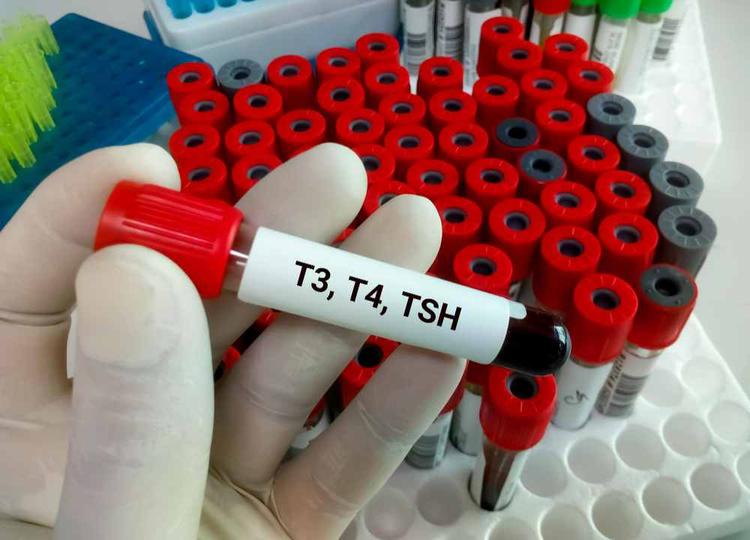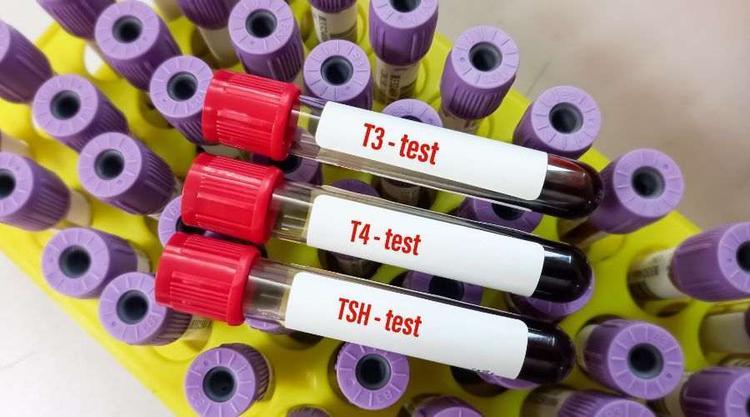7 Factors Influencing T3 Total Levels: Check Now

Medically Reviewed By
Dr Sohini Sengupta
Written By Kirti Saxena
on May 4, 2024
Last Edit Made By Kirti Saxena
on May 6, 2024

Thyroid is a common disease around the world and in India too. As per statistics, around 42 million people in India suffer from thyroid disease.
But why is the thyroid affecting millions of people?
Iodine is an essential element for normal thyroid functioning. WHO defines iodine deficiency as the most prevalent cause of thyroid. The deficiency of iodine may cause physical and mental retardation, goiter, hypothyroidism, and pregnancy complications.
The thyroid gland in your neck controls various body functions, such as how your body uses energy and controls body temperature, metabolism, and heart rate.
It produces two hormones: thyroxine or tetraiodothyronine (T4) and triiodothyronine (T3).
It helps maintain muscle control, brain development, and heart function. Any abnormality in T3 levels may lead to overactive and underactive thyroid.
According to the American Thyroid Association, a T3 blood test helps diagnose hyperthyroidism.
What is the Normal level of T3 hormone?
Your doctor may recommend the T3 Total test to measure the T3 levels in the blood.
- Normal T3 levels indicate no thyroid disease is detected. Check your T4 and TSH levels; you don't have thyroid disease if those factors look normal.
- The normal range of Total T3 is 60 to 180 ng/dL or 0.9 to 2.8 nmol/L.
- The normal range of Free T3 is 130 to 450 pg/dL or 2.0 to 7.0 pmol/L
- High T3 levels indicate hyperthyroidism, which means overactive thyroid hormone.
High T3 levels with low TSH and high free T4 indicate that your thyroid produces too much thyroid hormone. However, high T3 levels with normal or high TSH and high free T4 levels mean your pituitary gland is disturbed and causes too much thyroid hormone.
- Low T3 levels indicate hypothyroidism or underactive thyroid hormone.
Low or normal T3 levels with high TSH and low T4 levels mean your thyroid hormone produces too little thyroid hormone. However, low or normal T3 levels with low TSH and low T4 levels mean that the pituitary gland condition causes too little thyroid hormone.
Also Read- What is the thyroid normal range?
What are the symptoms of abnormal T3 hormones?
The symptoms might be different in different people. However, below are the common symptoms of abnormal T3 levels-
- Sweating
- fatigue
- Irritability
- Mood swings
- Difficulty sleeping
- Hair loss
- Irregular heartbeat
- Mood swings
- Irritability
- sensitivity to heat or cold
- Shortness of breath
- High blood sugar levels
- Increases frequency of urination
Seven factors that may influence your T3 Levels
Here are seven factors influencing T3 total levels:
-
Pregnancy
Pregnancy can increase T3 levels. This is because the placenta produces a hormone similar to TSH, which stimulates the thyroid gland to produce more thyroid hormone.
-
Diet
Iodine deficiency is one of the common causes of hypothyroidism. However, many foods negatively affect T3 thyroid levels.
Soy-based foods like soy, tofu, and soy milk are antithyroid foods. They contain goitrogenic compounds that negatively affect thyroid functioning.
Cruciferous vegetables like brassica vegetables, including broccoli, cabbage, cauliflower, rutabaga, choy sum, and turnip, also have goitrogenic effects that can affect T3 thyroid levels. Iron deficiency can also impair T3 and T4 levels.
There are many key nutrients which are essential for thyroid function. Selenium and zinc are vital nutrients. However, the deficiency of either of these nutrients may cause low T3 levels. Zinc is required for thyroid hormone receptors to function effectively, but its deficiency may impair the binding of T3 to your cellular receptor sites.
Also Read- Foods to Avoid if Diagnosed with Hypothyroidism and Hyperthyroidism
-
BMI (Body Mass Index)
Are you too obese or too thin?
Many studies have shown that BMI influences TSH and thyroid hormone levels. Even high maternal BMI is linked with high fetal TSH levels and increased fetal thyroid weight. Thyroid hormone levels and weight gain are associated with autoimmune disorders. Since the T3 receptors are reduced in obesity, both TSH and T3 levels increase.
-
Smoking and Alcohol
Alcohol hurts thyroid cells. However, a recent study shows that alcohol consumption may increase TSH levels and decrease T3 levels.
Similar to alcohol, cigarettes also contain toxic compounds that may directly damage our thyroid tissue. Smokers are at high risk of abnormal T3 levels along with thyroid cancer.
Also Read- Simple Lifestyle Changes To Manage Your Thyroid
-
Age
Age is another factor that influences the T3 levels. T3 travels through the blood bound to proteins. T3 levels naturally decline with age. This is because the thyroid gland becomes less active as we age. This natural decline in T3 doesn't necessarily cause health problems for everyone.
-
Gender
Women are at higher risk of developing thyroid disease. One in eight women will develop thyroid problems during her lifetime. This is due to hormonal changes throughout a woman's life, such as menstruation and pregnancy.
Estrogen and progesterone, sex hormones that fluctuate during the menstrual cycle, can slightly increase T3 levels.
During pregnancy, the placenta produces a hormone similar to TSH. This surge in TSH production stimulates the thyroid gland to produce more T3, leading to a temporary increase in T3 levels.
-
Medications
Did you know that certain medications may impact your thyroid functioning?
Some medications can interfere with thyroid hormone levels, including steroids, certain antidepressants, and amiodarone (a heart medication).
Medications like prednisone or methylprednisolone are similar to cortisol hormones that are released during stress and cause detrimental effects on thyroid function. These medications reduce t3 production, and in many patients, it can lead to autoimmune conditions like rheumatoid arthritis and IBD.
Also Read- Blood Tests for Thyroid to Identify Thyroid Problems
The bottom line
Normal T3 levels indicate that someone’s thyroid is producing an adequate amount of T3 hormone. High levels can indicate hyperthyroidism, and low levels can be a sign of hypothyroidism.
However, other factors can influence T3 levels, including certain medications and pregnancy. Therefore, a doctor may need to run additional tests to determine whether someone has a thyroid condition.
Treatment for thyroid conditions may involve medication and, in some cases, surgery.
Normal T3 levels indicate that the thyroid is functioning properly. T3, the active thyroid hormone, is critical in regulating metabolism, energy levels, and overall well-being. High or low levels may indicate hyperthyroidism or hypothyroidism.
Note that slight fluctuation in T3 may not be a cause for concern. However, if you experience symptoms like fatigue, weight changes, or mood swings, consulting a doctor is essential. They can assess your situation and recommend that you take the Total T3 (Triiodothyronine) Test to determine if further action is needed.
Be aware of the factors influencing T3 levels, and take a proactive approach to your thyroid health. Schedule regular checkups, maintain a balanced diet, and manage stress effectively.


